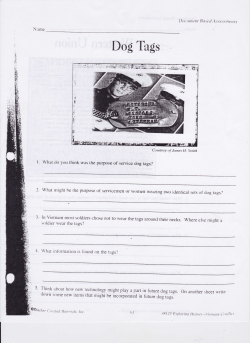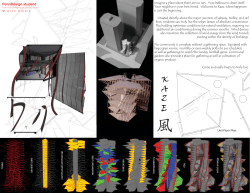
slides - Prosecco
Micro-Policies
A Framework for Verified,
Tag-Based Security Monitors
Cătălin Hrițcu
INRIA Paris-Rocquencourt, Prosecco team
Current collaborators on this project
• Formal verification
• Arthur Azevedo de Amorim (UPenn; INRIA intern 2014)
• Maxime Dénès (INRIA Gallium; previously UPenn)
• Nick Giannarakis (ENS Cachan; INRIA intern 2014)
• Cătălin Hrițcu (INRIA Prosecco; previously UPenn)
• Yannis Juglaret (Paris 7; INRIA intern 2015)
• Benjamin Pierce (UPenn)
• Antal Spector-Zabusky (UPenn)
• Andrew Tolmach (Portland State)
• Hardware architecture
• André DeHon, Udit Dhawan, ... (UPenn)
2
Computer systems are insecure
3
Computer systems are insecure
• Today’s CPUs are mindless bureaucrats
– “write past the end of this buffer”
– “jump to this untrusted integer”
– “return into the middle of this instruction”
... yes boss!
... right boss!
... sure boss!
• Software bears most of the burden for security
– pervasive security enforcement impractical
– security-performance tradeoff
– just write secure code ... all of it!
• Consequence: vulnerabilities in every system
– violations of well-studied
safety and security policies
4
Micro-policies
• general dynamic enforcement mechanism for
– critical invariants of all machine code
– high-level abstractions and programming models
• main idea: add word-sized tag to each machine word
– “this word is an instruction, and this one is a pointer”
– “this word comes from the net, and this is private to A and B”
• tags propagated on each instruction ... efficiently
– tags and rules defined by software (miss handler; verified)
– accelerated by hardware (rule cache, near-zero overhead hits)
5
Micro-policies for ...
•
•
•
•
•
•
•
•
•
information flow control (IFC) [Oakland’13, POPL’14]
monitor self-protection
Verified
(in Coq)
compartmentalization
[Oakland’15]
dynamic sealing
memory safety
code-data separation
control-flow integrity (CFI)
taint tracking
Evaluated
...
(<10% runtime overhead)
[ASPLOS’15]
6
Memory safety
• Prevent
– spatial violations: reading/writing out of bounds
– temporal violations: use after free, invalid free
• Pointers become unforgeable capabilities
– can only obtain a valid pointer to a memory region
• by allocating that region or
• by copying/offsetting an existing pointer to that region
7
Memory safety micro-policy
p←malloc k
fresh c
1
0
k-1
k
07
0@M(c,i)
0@M(c,i) ... 0@M(c,i) 7@M(c’,i)
q ← p + 1k
p = A8F0 @ptr(c)
c=c
!p ← 7
A8F1@ptr(c)
1K
=q
!q ← 42
c != c’
out of bounds
color of region
free p
Tv ::= i | ptr(c)
Tm ::= M(c,Tv) | F
color of region
tags on values
tags on memory
tag of content
8
Memory safety micro-policy
0
7@F
7
1
0@F
k
k-1
... 0@F
7@M(c’,i)
q←p+k
p = A8F0 @ptr(c)
free p
x ← !p
Tv ::= i | ptr(c)
use after free Tm ::= M(c,Tv) | F
A8F1@ptr(c)
K
=q
!q ← 42
c != c’
out of bounds
tags on values
tags on memory
9
Memory safety micro-policy
1. Sets of tags
Tv ::= i | ptr(c)
Tm ::= M(c,Tv) | F
Tpc ::= Tv
2. Transfer function
Record IVec := { op:opcode ; tpc:Tpc ; ti:Tm ; ts: ... }
Record OVec (op:opcode) := { trpc : Tpc ; tr : ... }
transfer : (iv:IVec) -> option (OVec (op iv))
Definition transfer iv :=
match iv with
| {op=Load; tpc=ptr(cpc); ti=M(cpc,i); ts=[ptr(c); M(c,Tv)]}
=> {trpc=ptr(cpc); tr=Tv}
| {op=Store; tpc=ptr(cpc); ti=M(cpc,i); ts=[ptr(c); Tv; M(c,Tv’)]}
=> {trpc=ptr(cpc); tr=M(c,Tv)}
...
10
Memory safety micro-policy
1. Sets of tags
Tv ::= i | ptr(c)
Tm ::= M(c,Tv) | F
Tpc ::= Tv
2. Transfer function
Record IVec := { op:opcode ; tpc:Tpc ; ti:Tm ; ts: ... }
Record OVec (op:opcode) := { trpc : Tpc ; tr : ... }
transfer : (iv:IVec) -> option (OVec (op iv))
3. Monitor services
Record service := { addr : word; sem : state -> option state; ... }
Definition mem_safety_services : list service :=
[malloc; free; base; size; eq].
11
Memory safe abstract machine
Verification
refines
Micro-policy
Symbolic machine
memory safety
micro-policy
refines
Concrete
machine
Rule cache
correctly
implements*
Monitor
Generic Framework
memory safety
monitor
ASM
*only proved for IFC [POPL 2014]
12
Abstract machine for P
P in {IFC,CFI}
secure
(e.g. noninterferent)
preserved by
Micro-policy
Symbolic machine
refinement
(data)
P
refinement
(data)
Concrete
machine
Rule cache
Monitor
monitor for P
secure
13
Future
•
Interaction with loader and compiler (static + dynamic)
–
•
•
•
•
•
•
•
•
•
Fully abstract compilation to micro-policies (Yannis, intern 2015)
... and operating system (e.g. protect the OS itself)
Micro-policy composition, formally
Language for writing micro-policies (symbolic rules)
Verification for real RISC instruction set (e.g. ARM)
More realistic processor (our-of-order execution, multi-core)
Concurrency (big can of worms, data race detection)
More micro-policies (e.g. stack protection, ...)
Formally study expressive power of micro-policies
Switch to F* for the proofs
14
© Copyright 2025









